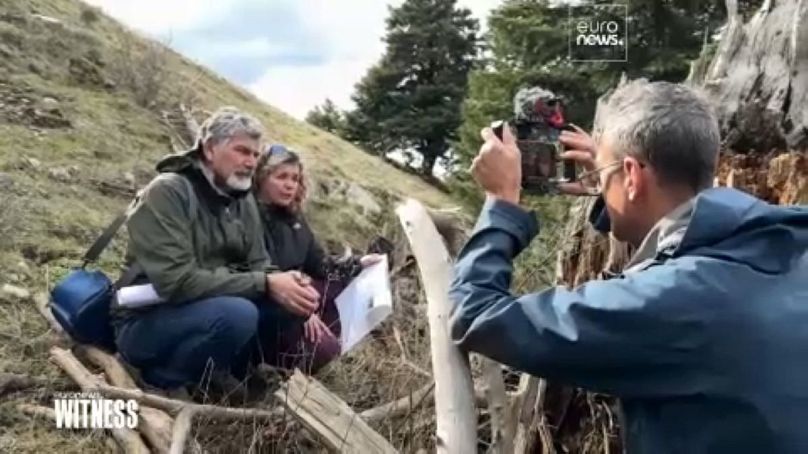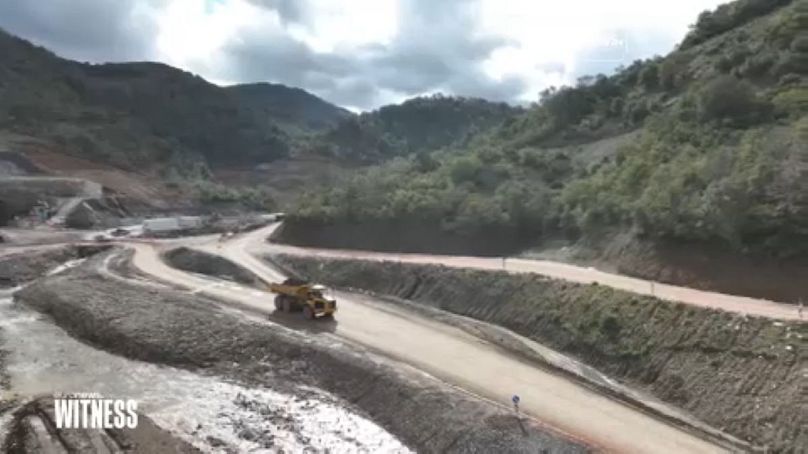Is Greece on its way to becoming Europe's renewable power outlet? Euronews reporter Hans von der Brelie investigates why the location of wind farms is so important and why everyone is not on board.
Renewable energy production is rapidly increasing all over Greece.
 ADVERTISEMENT
ADVERTISEMENT
 ADVERTISEMENT
ADVERTISEMENT
Prime Minister Kyriakos Mitsotakis and his conservative government have pledged to accelerate clean energy technologies to cover 80 per cent of the country's total energy production by 2030.
Ágios Geórgios, a weather-beaten rock in the Mediterranean Sea, off the coast of Athens, boasts 23 wind turbines which generate enough electricity to power more than 40,000 households back on the mainland.
The government has announced plans to build an additional 1,150 turbines on Greek islands or offshore over the next two decades - that's enough to generate 12 GW of wind power.
Greece’s installed wind power capacity is expected to reach 6,500 MW within the next three years. Greece's central region accommodates more than half of national installations or 2,293 MW.
This is partially thanks to the 153 wind power stations that were connected to the country's energy grid last year.
Costas Ilias works as an operations manager for Terna Energy, a company taking part in the offshore challenge. “Our vision is to make offshore a reality and try to secure the energy of Greece without any threats from abroad and, of course, to reduce CO2 emissions. Nearby on the coast we have high wind and we have to take advantage of this because it is like having gold,” he told Euronews.
Despite the current push, Greece fell behind on its renewable power goals in recent years. After the solar boom between 2011-2013, when more than 2,000 MW of photovoltaic capacity were installed, a mere 17 MW of new PV capacity were built between 2014–2018.
Consequently, Greece did not meet its 2020 target of 40 per cent renewables as part of total electricity production.
Too much of a good thing?
After years of recession, the European 'Wind Power Action Plan' is speeding up the permitting process and enticing developers. The European Investment Bank also offers credit guarantees and there are lots of EU grants available.
While many people in Greece consider wind power, an abundant and inexhaustible source of energy, a no-brainer as Europe aims for its net-zero goals, some up-and-coming wind farms are facing opposition from local residents and environmentalists alike.
The top concerns are:
- Wind farms can harm biodiversity and the preservation of endangered, threatened and special concern species.
- When constructed in renowned areas of natural beauty, wind turbines can interrupt the landscape. This can have consequences for the tourism industry and subsequently the local economy.
Professor Vassiliki Kati coordinates a research lab at the University of Ioannina. Her study on planning for wind parks has highlighted the country's apparent disregard for natural landscapes or protected areas and the negative impact wind farms can have on local habitats.
“In Austria, only 12 per cent of wind power stations are planted in mountainous zones, in Greece it's 92 per cent. That shows the lack of spatial planning in our country," explained Kati.
Renewable energies need huge storage capacities and Greece is creating them. Up to 1,000 people are working on a pumped storage hydropower project in Amfilochia. Surplus wind power is transformed into hydropower on demand.
The European project 'PCI-3.24' is co-financed by the 'Connecting Europe Facility', the EU tool designed to modernise infrastructure. “The total installed capacity of our project is 680 MW for production and 730 MW for pumping, while the total storage capacity is approximately 5 Gigawatt-hours," said Vangelis Vassis from the project development team.
"The total budget is €650 million, back in 2021, we got an EU grant worth €250 million. Terna Energy is trying to develop dozens of new hydro-pumped storage projects and let’s say three or four are mature enough right now to start construction. What would be really helpful is getting some European funding for this project," he added.
Renewables are a challenge for the grid. Good power connections are a precondition for transporting electricity to consumers when needed. The European Commission estimates that up to €600 billion should be invested into upgrading European grids by the end of this decade.
“Offshore wind is a very new element in our national energy and climate plan and this is why all these renewables of course are not needed for consumption within Greece," said Ioannis Margaris, the deputy chairman of the Greek grid operator IPTO.
“The strategy is for Greece to become an exporter of green energy to central Europe. Through the Balkans or Italy, to be able to export a surplus amount of renewables that we are going to have installed in Greece."
"This is why we recently proposed a new project between Greece and Germany that could go through the Adriatic Sea."
Margaris concluded by referring to the bigger picture: “There are also interconnections in the south, we have interconnections being planned with Egypt, with Saudi-Arabia. Due to Russia's invasion of Ukraine, Europe has a lot of vital interest in these kinds of interconnections.”












